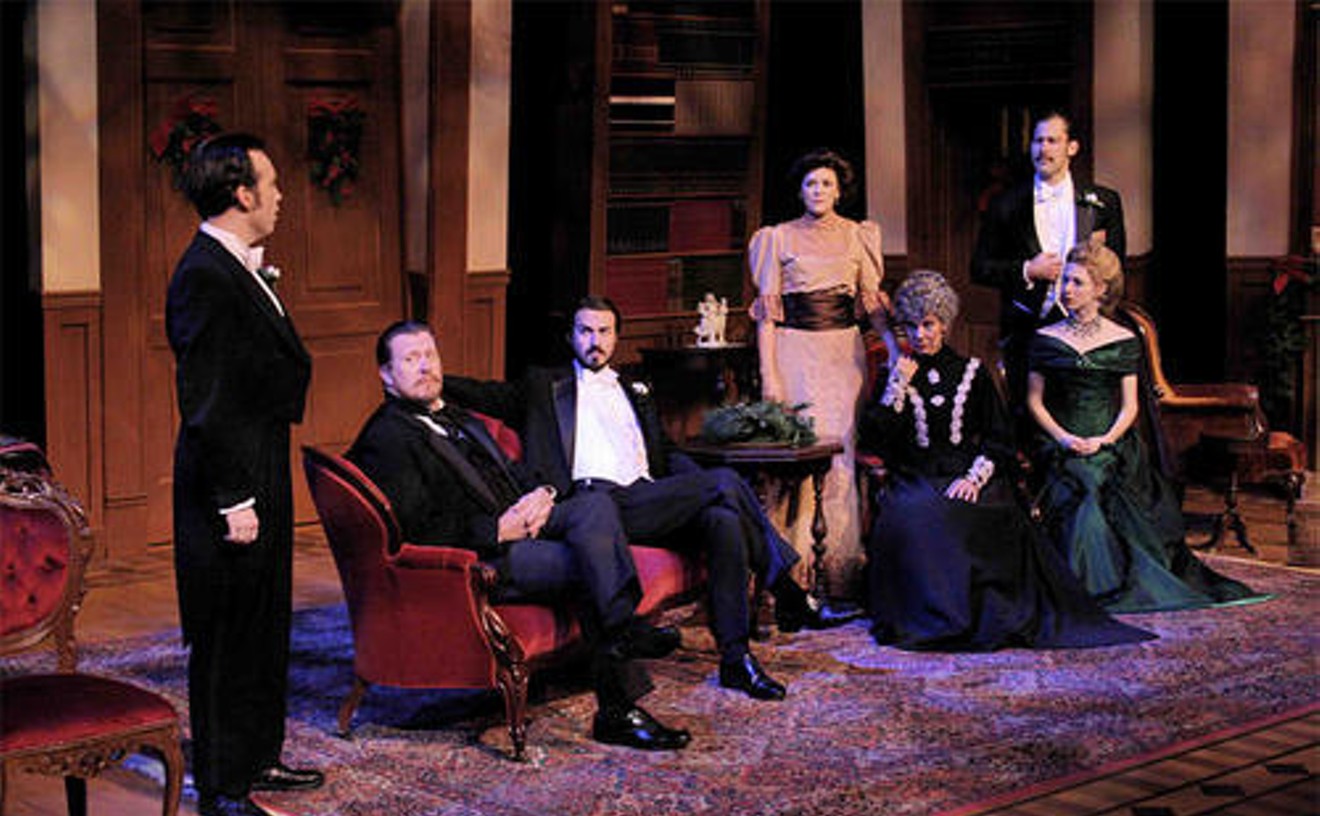Best Solo Show
Judith Delgado
In a season fraught with top-drawer solo performances (Charles Nelson Reilly in Life of Reilly, Kathleen Turner in Tallulah, Melinda Lopez in Media Noche, and Jean Stapleton in Eleanor: Her Secret Journey), Judith Delgado towered over all. Playing fashion diva Diana Vreeland, the actress delivered a performance that lived up to Vreeland's motto: "Give 'em what they didn't know they wanted." Vreeland's life story turned play won creators Mark Hampton and Mary Louise Wilson Drama Desk and Obie awards in 1996 when Wilson starred in it, and Elizabeth Ashley did the honors when the national tour passed through South Florida in 1998. Nonetheless, Delgado, a genius at transforming herself, turned the taste-maker and long-time Vogue editor into something of her own (and director Joseph Adler's) making. Even the actress' elegant, oversize hands conspired to become a perfect physical match for Vreeland's elegant, larger-than-life personality. It was a performance that reached out and grabbed us by our lapels.
Best Acoustic Performer
Raiford Starke
Hailing from the wilds of Falls Church, Virginia, now making his home in Hallandale Beach, Colin Kenny, a.k.a. Raiford Starke, has injected the otherwise touchy-feely local acoustic scene with jagged, rawboned blasts of accomplished pickin', singin', and harp-blowin'. Sure, Starke plays a mean electric guitar for local swamp funksters the Shack Daddys and sits in with Chief Jim Billie's band whenever an opportunity to jam arises, but it's as a solo acoustic act that the thickly bearded, soft-spoken 38-year-old troubadour really shines. With one stellar CD under his belt -- last year's Speak Me -- and a fast-growing reputation as a crowd-pleasing performer, it's been a sweet year for Starke, who in recent months has opened shows for the likes of Leon Russell and Chris Duarte. The fickle folks of South Florida probably don't deserve an acoustic act this good, but with Raiford Starke it looks like we're stuck with one.
Best Acoustic Performer
Raiford Starke
Hailing from the wilds of Falls Church, Virginia, now making his home in Hallandale Beach, Colin Kenny, a.k.a. Raiford Starke, has injected the otherwise touchy-feely local acoustic scene with jagged, rawboned blasts of accomplished pickin', singin', and harp-blowin'. Sure, Starke plays a mean electric guitar for local swamp funksters the Shack Daddys and sits in with Chief Jim Billie's band whenever an opportunity to jam arises, but it's as a solo acoustic act that the thickly bearded, soft-spoken 38-year-old troubadour really shines. With one stellar CD under his belt -- last year's Speak Me -- and a fast-growing reputation as a crowd-pleasing performer, it's been a sweet year for Starke, who in recent months has opened shows for the likes of Leon Russell and Chris Duarte. The fickle folks of South Florida probably don't deserve an acoustic act this good, but with Raiford Starke it looks like we're stuck with one.
Best Road Show
The Gin Game
There's plenty of choice horseflesh in South Florida each winter, but the most appealing thoroughbreds to pass through the region were Julie Harris and Charles Durning. The two arrived as part of the touring production of the National Actors Theatre's The Gin Game, directed by Charles Nelson Reilly. This sentimental piffle of a play by D.L. Coburn won the Pulitzer Prize For Drama in 1977, but it's the actors who have aged well. They portrayed Weller (Durning) and Fonsia (Harris), two old geezers abandoned by their families and dumped into a second-rate nursing home. Blending their disparate acting styles into a kind of demonic waltz (imagine a brainy spider battling cartoon character Foghorn Leghorn), Harris and Durning turned all dramatic expectations on their heads. In their hands, even a piece of dramatic dross can seem like gold.
Best Road Show
The Gin Game
There's plenty of choice horseflesh in South Florida each winter, but the most appealing thoroughbreds to pass through the region were Julie Harris and Charles Durning. The two arrived as part of the touring production of the National Actors Theatre's The Gin Game, directed by Charles Nelson Reilly. This sentimental piffle of a play by D.L. Coburn won the Pulitzer Prize For Drama in 1977, but it's the actors who have aged well. They portrayed Weller (Durning) and Fonsia (Harris), two old geezers abandoned by their families and dumped into a second-rate nursing home. Blending their disparate acting styles into a kind of demonic waltz (imagine a brainy spider battling cartoon character Foghorn Leghorn), Harris and Durning turned all dramatic expectations on their heads. In their hands, even a piece of dramatic dross can seem like gold.
Best Theater for Plays
Caldwell Theatre Company

Artistic director Michael Hall brought together such a disparate collection of dramas, comedies, and other compelling offerings last season that it's difficult to characterize the personality of his Caldwell Theatre Company. From the tense, prickly production of Paula Vogel's How I Learned to Drive to the unrealized yet maniacally funny rendition of Oscar E. Moore's King's Mare to Charles Nelson Reilly's hilarious one-man show, The Life of Reilly, the thread holding the Caldwell works together is their consistently top-drawer production values. Even something as goofy and insubstantial as Paul Firestone's Comedy of Eros received an endearing treatment, with titillating acting and a smart design. Michael Hall never undersells the playwrights he serves, and audiences benefit year after year.
- 7901 N. Federal Highway, Boca Raton, 33487 Map
- 561-241-7432
- www.caldwelltheatre.com
Best Theater for Plays
Caldwell Theatre Company
Artistic director Michael Hall brought together such a disparate collection of dramas, comedies, and other compelling offerings last season that it's difficult to characterize the personality of his Caldwell Theatre Company. From the tense, prickly production of Paula Vogel's How I Learned to Drive to the unrealized yet maniacally funny rendition of Oscar E. Moore's King's Mare to Charles Nelson Reilly's hilarious one-man show, The Life of Reilly, the thread holding the Caldwell works together is their consistently top-drawer production values. Even something as goofy and insubstantial as Paul Firestone's Comedy of Eros received an endearing treatment, with titillating acting and a smart design. Michael Hall never undersells the playwrights he serves, and audiences benefit year after year.
Best Punk Band
A New Found Glory
A cursory glance at or a quick listen to A New Found Glory won't likely make you expect overnight success or imminent world domination. But that's because you're not 16 years old. If you were you'd probably know that the Coral Springs band is currently being courted by representatives from a couple major record labels; that their concerts regularly become crowded, sweaty spectacles; and that their new album, Nothing Gold Can Stay, was last year's best-selling locally produced CD. The band's aggressively melodic pop-punk anthems have proved darn near irresistible: A recent standing-room-only affair at Fort Lauderdale's FU*BAR found the band's adoring, earnest fans, the majority of whom hail from local high schools, braving the stifling heat to sing along, hanging on each and every word to each and every song. Clearly something big is at work here. If you're lucky, you're not too old to discover what it is.
Best Punk Band
A New Found Glory
A cursory glance at or a quick listen to A New Found Glory won't likely make you expect overnight success or imminent world domination. But that's because you're not 16 years old. If you were you'd probably know that the Coral Springs band is currently being courted by representatives from a couple major record labels; that their concerts regularly become crowded, sweaty spectacles; and that their new album, Nothing Gold Can Stay, was last year's best-selling locally produced CD. The band's aggressively melodic pop-punk anthems have proved darn near irresistible: A recent standing-room-only affair at Fort Lauderdale's FU*BAR found the band's adoring, earnest fans, the majority of whom hail from local high schools, braving the stifling heat to sing along, hanging on each and every word to each and every song. Clearly something big is at work here. If you're lucky, you're not too old to discover what it is.
Best Concert
The American Analog Set
The mellowed-out Texans who make up the American Analog Set made one of their album titles come alive at this West Palm Beach gig. From Our Living Room to Yours summed up the intimacy of the low-key performance, with the band's rich, orange-red blend of warm organ and electric piano, soft-spoken vocals, tender strumming, and wispy bass lines entrancing the small but attentive crowd. The group's minimalism came through in extremely simple arrangements and lushly quiet melodies that evoked a variety of moods, from haunted to joyous to meditative. Touring behind the then-new release The Golden Band, American Analog Set certainly didn't rock in a conventional sense -- instead, the comfortable warmth of their homemade songs was soothing and satisfying. High points included the beautifully textured "The Wait," which glowed like a fireplace, the ambient-folk epic "New Drifters," and the heady, psychedelic drone of "Don't Wake Me." Anyone with low expectations for this lovely low-impact, low-fi quintet came away with a new respect for simplicity, felicity, and taste. Knowing that magical concerts like this don't come around often, Respectable Street added the phrase, "West Palm Beach Gets Show It Doesn't Deserve," to promotional posters for the event.





